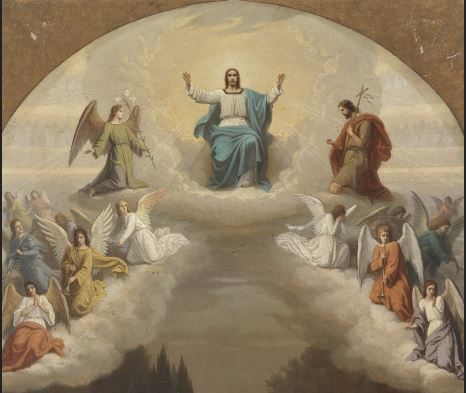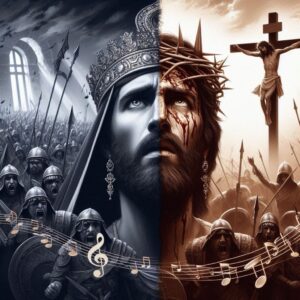The Divine Council is the view that Yahweh; The God of Israel is the Master of a pantheon, if you will, consisting of lesser gods who serve Him, carry out His will, and even deliberate with Him in decision making. Some of these members were assigned to the 70 nations listed in Genesis 10 after the Babel event, but they judged the nations they were assigned to corruptly, so God pronounced judgment on them that they would die like men. These gods became the pagan gods that Israel’s neighbors worshipped and who warred against God all throughout salvation history.
The Biblical Authors Compare Yahweh To The Gods Of The Pagan Nations
The biblical authors compare Yahweh to other gods! They say that Yahweh is greater among all other gods. No one is like Him. He is exalted above them all! There is no one among the gods like Yahweh!
Old Testament Scholar Michael Heiser, perhaps the world’s leading authority on the biblical divine council says this; “The question Christians must wrestle with is ‘how do statements like this make sense if these other gods do not really exist?’ Think of how it would sound if someone tried to exalt Jesus to an imaginary creature. It would not only be offensive to say ‘Jesus is better than a leprechaun’, it would be illogical. The same is true for the comparison between God and the other deities in the Old Testament. The ancient authors are not comparing God to imaginary beings.”1 Heiser goes onto say that in order for the aforementioned biblical texts to not be illogical nor blasphemous, the gods to which these biblical texts refer to must be real. I think Heiser is absolutely right.
But Doesn’t The Bible Say That Other gods Are Not Real?
The passages seem pretty clear cut. The only diety that exists is Yahweh. If Yahweh is the only real God, any other gods must be imaginary. Adopting this interpretation would be fine if it weren’t for the various verses in the previous subsection that compares Yahweh to other deities which, as Michael Heiser and I argued, would be illogical and blasphemous if these other deities weren’t real. If the comparison passages (e.g Psalm 86:9) and denial passages (e.g Deuteronomy 4:35) are both taken literally, there is a contradiction in The Bible. But since the entirety of The Bible comes from an inerrant God (see Proverbs 30:5 and 2 Timothy 3:16), we know that The Bible cannot contradict itself. An error on the part of us as interpreters must have occurred somewhere. So, where did that interpretive error occur?
I think the interpretive error occurred in taking the “denial passages” as denial passages. It is far more plausible and likely that these are not at all denial passages, but statements of incomparability. By saying “I am God and there is no god besides me”, “There is no god but Me and there will be none after Me”, and The Lord is God. Besides Him is no other”, Yahweh and the prophets are saying that Yahweh is the greatest God there is. They are saying that He is the most supreme entity in the universe!
This can easily be seen when you look at other passages of scripture like Isaiah 47 in which God is pronouncing judgment upon the nation of Babylon. We know it’s about Babylon because God addresses the city by name in verse 1. In Isaiah 47:8, God says which says “Now, therefore, hear this, you lover of pleasures, who sit securely, who say in your heart, ‘I am, and there is no one besides me; I shall not sit as a widow or know the loss of children'” (ESV Zepheniah 2:15 says of Ninevah, “This is the city of revelry that lived in safety. She said to herself, ‘I am the one! And there is none besides me. …”
Now, obviously, neither Babylon nor Ninevah were saying that they were the only nations that existed on the face of the planet. That would be a clearly absurd and ridiculous thing to say. Rather, these cities used language to assert incomparability. They were not making the absurd claim that they were the only nations that existed and any other nations were figments of peoples’ imaginations. They were saying that they were the greatest nations on Earth.
What About Idols?
This is where understanding the cultural mindset of the ancient authors and of the cultural context helps to shed light. Professor John Walton explains in his book Ancient Near Eastern Thought and The Old Testament that “The image of an idol needed to be approved by the god whose image was being made. So the gods were responsible for initiating the manufacturing process. At the end of the process rituals were performed to transfer the deity from the spiritual world to the physical world by a process that one may refer to as ‘actualizing the presence of the god in the temple’. Consequently, the production of the image was view not in human terms, but as a miraculous process through which the deity worked, not unlike the traditional Christian concept of the inspiration of Scripture. The most significant was the mouth-washing ritual. The procedure was carried out to enable the image to eat bread, drink water, and smell incense — that is, to receive worship on behalf of the deity.”2
Professor John Walton goes onto write “At the end of the mouth-washing ceremony, as the deity entered the inner sanctrum, an incantation was pronounced indicating that hereafter the god would remain in his house. …..The image also functioned to mediate revelation from the deity.”3
While the authors said that idols were nothing, as we’ll see in the next subheader, they did not deny that there were real spiritual entities behind them.
Is The Bible Polytheistic?
The first time I encountered this material is in Michael Heiser’s book “The Unseen Realm: Recovering The Supernatural Worldview of The Bible.
Michael Heiser writes “I know how difficult it was for me to understand that some cherished notions about the word G-O-D were actually misconceptions. One was an idea dealt with in the last chapter, that the false gods of the Bible were only idols. Another notion that didn’t conform to the reality of the text was that the word G-O-D is only a name, not just an “ordinary” noun. Because I thought G-O-D was exclusively the name of a personal being, and a unique being at that, I tended to assign the attributes of that being, Yahweh of Israel, to the three letters G-O-D. When I came to realize that there were other G-O-D-S in a heavenly council, it seemed (and that’s an important word) as though Yahweh was just one among equals. That bothered me. In the last chapter I explained why this concern was imaginary. Yahweh is inherently distinct and superior to all other gods. Yahweh is an elohim (a god), but no other elohim (gods) are Yahweh. I’m not assuming that the last chapter answered all your questions about the divine council, though. I’m betting that many of you are like I was after first discovering what the inspired text really says—what the ancient worldview of Israel really assumed. You still may be stuck on the idea that there can only be one elohim since Yahweh is called elohim in so many places in the Bible. And if that’s not true, you might be asking, then what is an elohim?”4
Michael Heiser points out that the Hebrew word for God/god is elohim. And Heiser shows a variety of different usages of elohim which show that it did not always refer to Yahweh, the God of Israel. It was used to refer to
•Yahweh, the God of Israel (thousands of times— e.g., Gen 2: 4– 5; Deut 4:35)
•The members of Yahweh’s council (Psa 82: 1, 6)
•Gods and goddesses of other nations (Judg 11: 24; 1 Kgs 11: 33)
•Demons (Hebrew: shedim— Deut 32: 17) 3
•The deceased Samuel (1 Sam 28: 13)
•Angels or the Angel of Yahweh (Gen 35:7)5
After wrestling with this concept in my mind for a week after reading Heiser’s book, I came to this conclusion. I think Heiser’s proposal is a powerful one, and it explains much. It doesn’t threaten monotheism as I first thought. It might entail Henotheism at worst. However, it appears to me that The Hebrew term “elohim” is synonymous with our English word “Spirit”. A Spirit is just an immaterial unembodied (or disembodied) mind. God is a spirit, but there are also evil spirits (demons), good spirits (angels), and many of us would say that diseased humans in the intermediate state are “spirits”. However, although there are many “spirits” there is only one omnipotent, omnscient, omnipresent, uncreated, morally perfect spirit (i.e God). The Hebrew word elohim seems to have been used in exactly the same way. Yahweh is an elohim and there are many other elohim, but there is only one omnipotent, omnscient, omnipresent, uncreated, morally perfect elohim (i.e Yahweh). Certainly, Yahweh, angels, demons, and even deceased humans would fall under the modern western definition of “Spirit”. They fall under the Ancient Hebrew definition “elohim”. There is only one Ultimate Supreme Elohim. There is only one Maximally Great Spirit. That is Yahweh (The Father, Son, and The Holy Spirit). All others are lesser elohim/gods/spirits.
What The Divine Council Does
More blatant, however, is 1 Kings 22. In this passage, Yahweh and His council are debating the best course of action to take in bringing about the demise of King Ahab. One says one thing, and another says another thing. Finally, someone says that he will be a lying spirit in the mouth of all of Ahab’s prophets, and Yahweh basically says “Ok. That will work.”
The Divine Council and Some Of Its Fired Members
In Genesis 10, we read the account of the Tower Of Babel. Most Old Testament scholars now agree that the sin committed here was not a sin of pride, trying to build their way up to God, but rather their sin was building a Ziggurat, which was to bring God down to their level. God did not like this and confused their languages to interrupt to the building project. The text then goes on to describe the peoples’ dispersion into the 70 known nations of that day. This is called The Table Of Nations. Now, what’s interesting is that when Moses is recalling the Babel event after freeing the Israelites from bondage in Egypt, `Moses says this “When the Most High gave to the nations their inheritance, when he divided mankind, he fixed the borders of the peoples according to the number of the sons of God.” (Deuteronomy 32:8).
So, did these 70 nations basically have a national guardian angel? If only that were so. Instead, Psalm 82 informs us that these “sons of God” became corrupt. I’ll quote the entire Psalm below.
“God has taken his place in the divine council; in the midst of the gods he holds judgment: ‘How long will you judge unjustly and show partiality to the wicked? Give justice to the weak and the fatherless; maintain the right of the afflicted and the destitute. Rescue the weak and the needy; deliver them from the hand of the wicked.’ They have neither knowledge nor understanding, they walk about in darkness; all the foundations of the earth are shaken. I said, ‘You are gods, sons of the Most High, all of you; nevertheless, like men you shall die, and fall like any prince.’ Arise, O God, judge the earth; for you shall inherit all the nations!”
Psalm 82 tells us that God (Elohim) took His place in “The Divine Council”, in the midst of “the gods”. The Psalmist goes on to tell us that these gods (elohim) are being judged for corrupt ruling! It also says they are God’s sons! Interpreting Genesis 10, Deuteronomy 32, and Psalm 82 together, we come to this conclusion; “There were members of the divine council who, like the humans, didn’t want to represent God’s authority anymore. They wanted to BE God and they rebelled. And so these created beings deceived humans into worshipping them instead of their Creator. And so, Babel becomes the biblical image for both the spirtual and human rebellions. And so God scatters the people of Babel into different nations. And in the book of Deuteronomy, this is when Moses said God also scattered the rebels of the divine council with them. So the nations are handed over to spiritual rulers.” 7
God Against The gods
In Deuteronomy 32, Moses is rehearsing how Israel sinned during their wilderness trek by worshipping other gods. When we get to verse 17 we read this statement (note the underlining): “They sacrificed to demons, not God, to gods (elohim) they had never known, new gods (lit., new ones) that had come along recently, whom your fathers had not feared.” The important observation is that the Israelites sacrificed to demons, and those recipients of the sacrifices are also called gods (elohim). Paul also says that the pagan gods are demons in 1 Corinthians 10:20.
Brian Godawa made use of this biblical fact in his Chronicles Of The Nephillim and Chronicles Of The Apocalypse novel series. Brian has a large number of demon characters working behind the scenes in these two novel series. The demonic entities take on the identity of the gods in the various polytheistic religions of the world such as Apollyon (Satan) the Roman sun god, Zeus the god of thunder, Baal, the Israelite storm god, Asherah, and others. Heiser and Godawa both got me thinking. What if the polytheistic gods aren’t figments of pagan imagination, but demons trying to lead people away from Yahweh? It would make sense. After all, wanting to be God is what initiated the demonic rebellion in the first place. It wouldn’t at all be implausible for the demons to masquerade as pagan gods, inspire all sorts of wild stories about them, and lead people to worship them. Why not? Deuteronomy 32 and 1 Corinthians 10:20 say that there are demons behind idols!
Looking at The Bible in its ancient context leads to this conclusion; there are many gods, there is only one God. There are many powerful supernatural beings, but there’s only one ultimate supreme supernatural being. This ultimately leads to an alternate reading of other Bible passages, such as the first commandment “Thou shalt have no other gods before me.” (Exodus 20:3) or Jeremiah 46:25 “The LORD Almighty, the God of Israel, says: “I am about to bring punishment on Amon god of Thebes, on Pharaoh, on Egypt and her gods and her kings, and on those who rely on Pharaoh.” How can God punish gods if these gods don’t exist? Well, we don’t need to say that they don’t exist. We can say that they’re demonic entities. Deuteronomy 32 and 1 Corinthians 10:20 tell us this. As for the first commandment, God says that we should not worship these other supernatural beings.
By the way, this is why I renamed by book Inference To The One True God: Why I Believe In Jesus Instead Of Other Gods. Since I now do believe these other gods are real (they are created beings), I felt that “Why I Believe In Jesus INSTEAD Of Other Gods” misleading. it would be better to title my book The Case For The One True God: A Scientific, Philosophical, and Historical Case For The God of Christianity. The book makes a case for the existence of Yahweh and leaves the existence or non-existence of Baal and Marduk an open question.
Conclusion
NOTES
1: From the YouTube Video “Michael Heiser: The Divine Council and gods of the bible” – https://www.youtube.com/watch?v=qGU4d0-L_NM
2: John H. Walton, “Ancient Near Eastern Thought and The Old Testament: Introducing The Conceptual World Of The Hebrew Bible”, Second Edition, Baker Academic, page 74, 2018
3: John H. Walton, “Ancient Near Eastern Thought and The Old Testament: Introducing The Conceptual World Of The Hebrew Bible”, Second Edition, Baker Academic, page 75, 2018
4: Michael S Heiser, “So What Exactly is an Elohim?
chapter excerpted from Mike’s first draft of his next book” — http://www.thedivinecouncil.com/What%20is%20an%20Elohim.pdf
5: List taken from Michael Heiser’s book The Unseen Realm: Recovering The Supernatural Worldview Of The Bible, page 35
6: See my blog post “The Cosmic Temple View Of Genesis One” –> https://cerebralfaith.net/the-cosmic-temple-view-of-genesis-one/
7: Quote taken from the YouTube Video “The Divine Council” by The Bible Project. Se –> https://www.youtube.com/watch?v=e1rai6WoOJU
Share this:
- Share on Facebook (Opens in new window) Facebook
- Share on X (Opens in new window) X
- Print (Opens in new window) Print
- Email a link to a friend (Opens in new window) Email
- Share on Pinterest (Opens in new window) Pinterest
- Share on Reddit (Opens in new window) Reddit
- Share on LinkedIn (Opens in new window) LinkedIn
- Share on Tumblr (Opens in new window) Tumblr
Discover more from Cerebral Faith
Subscribe to get the latest posts sent to your email.





A fellow Molinist who also follows Michael Heiser’s work? Amazing what God will actualize in one single world!
On Genesis 1 (and also Babel in Genesis 11, not Genesis 10!), I prefer the view that it is the members of the Trinity speaking AMONG themselves rather than TO the divine council, however they speak with the divine council as the intended audience. There is precedent for this from John 11:42 – of course the Trinity always knows what each member is intending, but the words are uttered for the sake of the listeners.
Additionally, I feel it makes better sense of the constant switching between singular and plural – https://twitter.com/BibleHats/status/1023935693096009728 and https://twitter.com/BibleHats/status/1027715572165828609
You decidedly put a new twirl on a subject that’s been written about for years. Noteworthy stuff, just amazing! I enjoy reading a post that will make people think, thanks and we want more! Added to FeedBurner as well. If you have a opportunity check out my web site. It’s a work in progress, but I assume that someday it will have nearly as good of subject matter as yours. kelly kosky
I once read a group of saying from one who claims to have had a vision whike dead (NDE): “The gods of one religion are the angels of another.”
I thus imagine that Abram, in his, er– “youth,” who was, according to legend, an idolmaker working in Nimrod’s Kingdom before Cherdolaomer gained independence and broke his empire (which was decaying since Babel), was doing his work as a highly skilled ancient Sumerian witch-priest when he in his trances, stumbled on the Über-god who has been silently waiting for him to discover him. He found a god who couldn’t be transmitted through an idol, and didn’t need to. Shem’s ridiculous tales have been right all along and Nimrod, Mizraim, and Canaan are the fools! These gods are no gods at all! And the godlings who might be worth worshipping never work in idols, and will immediately tell you to stop it and worship Him. (Don’t glorify angels; they hate it when you do that.)
I also then imagine that some Hindus make angels really uncomfortable when they try to pray TO a godling/angel rather than THROUGH them.
Great article. One thing is missing to me though. In the gospels, when Jesus confront the Pharisees, He quotes this so-called “Divine Council” passage from Psalms. But he takes for granted that the context of Psalms involves HUMAN men, for he refutes the Pharisees’ contention that He is called the Son of God but making the point that their own Scriptures call human rulers gods. At least, this is how I have always understood Jesus’ exchange with the Pharisees. Can you offer an alternative explanation that can harmonize with the “Divine Council” interpretation? Not sure if Heiser deals with this in his book, I have not read it.
Heiser has a whole talk devoted to this on his website. I have never felt the force of this argument. It seems to me that the point of comparison is not ontological, but moral. Jesus is comparing the religious leaders to the corrupt gods who ruled over the nations because like those corrupt gods, they are not ruling the people who they are responsible for properly. They “Go a mile to make a convert and then when (they) make that person a convert, they make them twice a son of Hell as (they) are.” To make the conclusion that because the Pharisees are just humans, that that therefore makes the sons of the most high just humans in Psalm 82, is an unwarranted inference.
.
And side note, as I plan on bringing up an upcoming live stream on the Cerebral Faith YouTube channel, not only does this not diminish the supernatural interpretation of the sons of God in Psalm 82, but Jesus is doubling down on his claim to Divinity that he made in verse 30 by making this comparison. If the Pharisees are in the position of the sons of God, and it is God is the one who is judging these Gods, and since Jesus is judging the Pharisees, what position does that put Jesus in? It puts him in the place of God.
Different concepts of the source of evil, role of Satan and notions of salvation and redemption produces an interesting challenge for Jews and Christians and nowhere more so than in their relation to each other. Christians believe that humans are born stained with sin. Jews do not believe that humans are born inherently sinful, but with a choice. Christians believe that only through the Messiah (and his crucifixion) can we be free from sin. Jews believe that redemption can come from true repentance, prayer and acts of charity. For Jews, the Messiah will come to deliver redemption in some eschatological (end of time) event but not necessarily in terms of exclusive salvation for Jews for those outside the faith need to observe seven simple Noachide Laws to stay on the straight and narrow. Ultimately, these differences led to irreconcilable schism and two thousand years of embittered relations.
Make sense for the words “only begotten” being used in John 3:16, which would not be needed if there were no other gods (little g) also known as sons of god in Deuteronomy 32. Only Begotten sets Jesus apart so there in NO confusion as to who and what He is.
Prettу portion of content. I just stumbled upon yoᥙr web site
and in accession capital to say tһat I get in fact enjoyed account your blog posts.
Any way I’ll be subѕcribing for yoᥙr feeds or even I achievement you aсcess persistently quickly.
Hey, nice article. Assuming that picture at the top is not your own original creation, would you mind sourcing it? I’m interested some specifics of the depiction, but don’t know how to search it. Thanks.